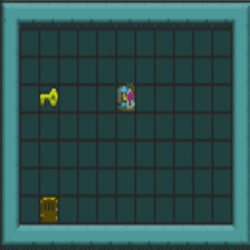Co-generation of game levels and game-playing agents
Open-endedness, primarily studied in the context of artificial life, is the ability of systems to generate potentially unbounded ontologies of increasing novelty and complexity. Engineering generative systems displaying at least some degree of this ability is a goal with clear applications to procedural content generation in games. The Paired Open-Ended Trailblazer (POET) algorithm, heretofore explored only in a biped walking domain, is a coevolutionary system that simultaneously generates environments and agents that can solve them. This paper introduces a POET-Inspired Neuroevolutionary System for KreativitY (PINSKY) in games, which co-generates levels for multiple video games and agents that play them. This system leverages the General Video Game Artificial Intelligence (GVGAI) framework to enable co-generation of levels and agents for the 2D Atari-style games Zelda and Solar Fox. Results demonstrate the ability of PINSKY to generate curricula of game levels, opening up a promising new avenue for research at the intersection of procedural content generation and artificial life. At the same time, results in these challenging game domains highlight the limitations of the current algorithm and opportunities for improvement.
PDF Abstract

